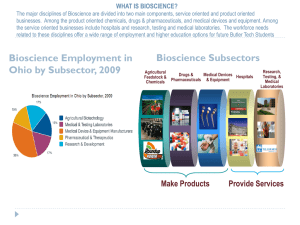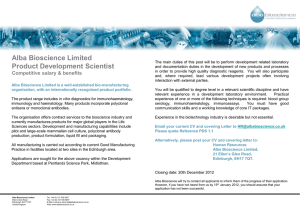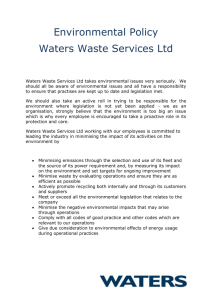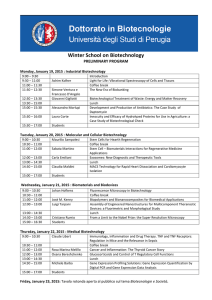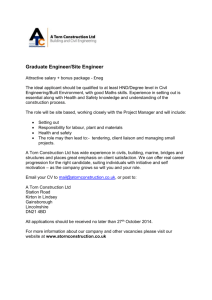Briefing Notes - Biotechnology YES
advertisement
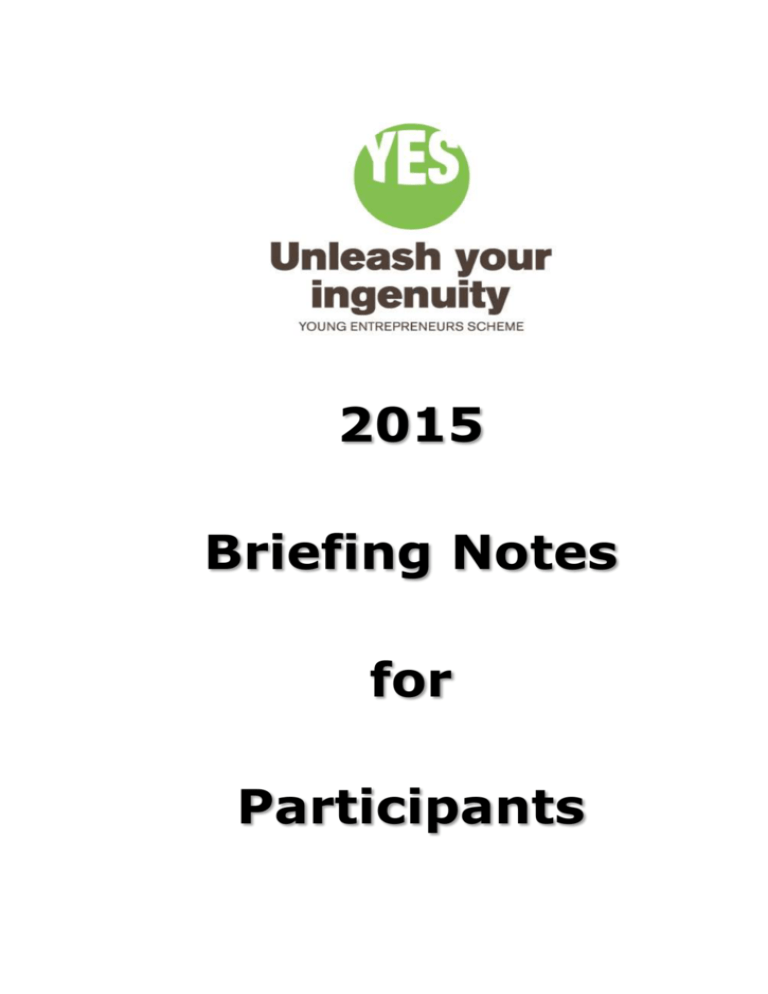
2015 Briefing Notes for Participants Table of Contents Welcome to the 2015 Competition ..................................................................................... 1 Programme for the 2015 Competition................................................................................. 2 Schedule..................................................................................................................... 2 Logistics ..................................................................................................................... 2 At the workshop .......................................................................................................... 3 Your Biotech Business ...................................................................................................... 4 Where do you start? ..................................................................................................... 4 Your business idea ....................................................................................................... 4 Themes ...................................................................................................................... 5 Things to consider ........................................................................................................ 6 Protecting your idea ..................................................................................................... 6 Is there a market for your product/service? .................................................................... 7 What is your business strategy? .................................................................................... 7 Preparing the business plan .......................................................................................... 7 Help?! ........................................................................................................................ 8 Team Roles ..................................................................................................................... 9 Where to Find Relevant Information ................................................................................. 10 Patent Information ..................................................................................................... 10 Regional Agencies ...................................................................................................... 10 Research Councils and Agencies .................................................................................. 10 Companies ................................................................................................................ 11 Other Sites ............................................................................................................... 11 Example Programme Outline ........................................................................................... 12 Planning Guide .............................................................................................................. 13 Welcome to the 2015 Competition We are pleased that you have decided to participate in the Biotechnology YES competition and we are sure that you will find it a valuable experience. The world of work is constantly changing and postgraduate researchers now expect to hold several jobs with different employers before they reach the end of their careers. We hope that by taking part in YES you will develop an awareness of the needs of industry in respect to the breadth of skills that an employer is seeking. You will also consider the implications of starting your own “business” and gain an understanding of the issues and considerations involved in the commercialisation of bioscience research. The biosciences have been in the forefront of new industrial developments in the UK for the past two decades and there is no doubt that biotechnology will be an area of continued growth and a focus for employment of young scientists in the discipline. By taking part in this competition you will have the opportunity to hear presentations by representatives from the biotechnology industry, and the related financial and legal sectors, about the ways they go about making a business work. This competition has been devised for you to further understand the processes involved in bringing the biosciences to the marketplace. You will be part of a team that is given the task of developing a hypothetical business, and in the exercise you will produce a business plan that shows the business could be viable, investable and ultimately successful. Page 1 Programme for the 2015 Competition Schedule 30 Sept – 02 Oct Food, nutrition and wellbeing Workshop: Unilever, Colworth Accommodation: The Park Inn Bedford 07 – 09 October Bioscience - Nottingham Workshop: MediCity Nottingham Accommodation: Park Plaza Nottingham 14 – 16 October Biomedical Workshop: GSK and Stevenage Bioscience Catalyst Accommodation: Holiday Inn Stevenage 21 – 23 October Bioscience - Manchester Workshop: Old Trafford Accommodation: Ramada Manchester, Salford Quays 04 – 06 November Bioscience - Edinburgh Workshop: Holiday Inn Edinburgh (Corstorphine Road, EH12 6UA) Accommodation: Holiday Inn Edinburgh 11 – 13 November Plant, microbial and environmental Workshop: Syngenta, Jealott's Hill International Research Centre Accommodation: Coppid Beech 10 December Final Venue: London Logistics Accommodation will be provided on the Wednesday and Thursday night. Meals will be provided throughout the three days of the workshop (see page 12 for the programme outline). Bedroom check-in is after 15.00 on the Wednesday and check out on the Friday is 12.00. A secure room for your luggage will be provided on the Wednesday and Friday. Any incidentals (eg telephone calls, newspapers, drinks) will need to be settled on your departure. Reasonable travel expenses will be re-imbursed. Further information on the travel policy can be found at http://www.biotechnologyyes.co.uk/biotechnologyyes/workshops/travelpolicy.aspx. Page 2 At the workshop Recognising the pressures on your time we have organised the competition over the shortest time scale that is reasonable. To achieve the goal you have been set it is therefore essential that your team has come up with the idea, and have carried out the market research, which will be the basis of your company before attending the workshop. The timetable clearly indicates the pressure you will be working under so it is imperative that you get down to organising and preparing your business plan as quickly as possible on the Wednesday afternoon. You do not have to prepare a hard copy of your plan because you will be assessed solely on the oral presentation. Mentors will be at hand to answer questions, give advice and provide a focus for your ideas. You are encouraged to seek advice from the mentors on your general strategy and in relation to specific aspects of your planning. You should recognise that mentors can only offer you advice – there are no definitive answers and part of your remit is to decide on the best strategy for your ‘start-up’ company. You will also need to consider carefully how best to organise your time with the mentors to get the most value from their input. Mentors will be available on Wednesday and Thursday afternoon. Your electronic presentation, using Microsoft PowerPoint, must be saved on a USB and submitted at 8am on the Friday morning. It is essential that you arrange for your team to bring a PC, preferably a lap-top, to the workshop as we are unable to provide computers for your use. If you wish to produce printouts then a printer is also required. You will need to ensure these are properly covered by insurance. Presentation of your business plan before a panel of assessors will take place on the Friday. Each team is allotted 25 minutes; 15 minutes presentation and 10 minutes for questions. You must keep strictly to time. The criteria against which your business plan will be judged: overall structure and presentation; feasibility of the research and development and IP strategy; feasibility of the commercial and marketing strategy; feasibility of the financial planning strategy; and feasibility of the management and personnel strategy. You will be competing in a group of either seven or more teams. One of which will be selected to progress to the final. The teams selected to go forward to the final of the competition, to be held in London in December, will be required to submit a hard copy of an executive summary (1 page size A4) of their business plan. This should be emailed to Tracey Hassall-Jones by Friday 27 November. Page 3 Your Biotech Business The task you will be set in the Biotechnology YES competition is to produce a business plan for a hypothetical biotech company. Establishing and operating a successful business needs careful thought and planning. A business must have objectives and plans to show how these will be achieved. The formulation and documentation of these various ideas is a business plan. In real life, as a company develops, the plan evolves to reflect this and it is always there for the directors of the business to use as their yardstick to measure the growth and progression of the company. Business plans are also required when a company seeks funding to start up or to further its development. In this respect the plan is a “selling” document. Your team’s plan will describe your hypothetical business and will be presented to a panel of specialists, who represent hypothetical investors. The aim of your presentation is to convince the panel to invest in your team and company. Where do you start? Your business idea Firstly, you need an idea for your business. You might consider whether the work of one of the members of your team has the potential to be developed as a new product or service. Alternatively, look in journals such as New Scientist or Nature for ideas with similar potential. Please note: it is very important that if your idea is based on a piece of real research in your laboratory that is not yet in the public domain, you seek advice from your Supervisor/Head of Department. As you will learn at the workshop, disclosure of confidential information can prevent patenting the idea that has been disclosed. We would therefore suggest that your business idea be based on real science that is in the public domain, while ensuring that the product development is fictitious, so that problems regarding confidentiality can be avoided. Examples of ideas from the 2014 competition included: CLEANZYME University of Manchester CLEANZYME developed a revolutionary biocatalytic cleaning technology designed to reduce the downtime of industry-scale chemical reactors by expediting the cleaning process. The CLEANZYME core carries an array of immobilised enzymes which are capable of degrading the most common contaminants found in such reactors, converting them into highly soluble compounds which can be washed away. EnviroGrow Ltd Rothamsted Research EnviroGrow Ltd developed a biodegradable scaffold matrix which can be used to encapsulate microbial inoculum for additions to soil. The first product in their portfolio is PhosphoGrow which contains a phosphate solubilising fungus which makes the existing soil inorganic phosphorous available to crop plants. Geltide Biosolutions University of Leeds A patented self-assembling peptide slow release drug delivery platform that has controllable chemical and mechanical properties as well as gelation kinetics and release profiles. The current application focus of Geltide Biosolutions is in the treatment of chronic back pain caused by a bacterial infection. Page 4 Haemotech University of Liverpool Most cardiovascular disease is caused by atherosclerosis, the build-up of fatty deposits (plaques) resulting in the narrowing or blockage of one or more major arteries. Haemotech developed a novel ‘plaque-busting’ drug specifically targeting and degrading these plaques into smaller pieces, thereby improving blood flow and quality of life. InfectDetect Ltd Imperial College London InfectDetect Ltd developed a paper-based diagnostic test that will allow the diagnosis of bacterial or viral infections in six minutes. Aiming to target inappropriate prescribing of antibiotics, the VBXpress test will be a vital tool in the fight against antimicrobial resistance in the future. Melatec University of Manchester Melatec developed a hair serum which reverses the greying process through a novel, patented system that breaks down the build-up of hydrogen peroxide seen in grey hair follicles. MiraeTech Rothamsted Research MiraeTech developed a novel delivery system that provides an efficient, sustainable and cost-effective method for the application of phosphorus fertilizer. Nanogen Ltd University of Liverpool Nanogen Ltd developed a non-invasive therapy to aid joint repair in osteoarthritis. Their product is a topically applied gel containing nanovesicles that are able to penetrate into the joint capsule. Here, they release a compound that not only combats joint pain but also targets the cause of joint degeneration. Phytec Durham University Phytec extracted and purified a natural plant compound which can increase muscle mass development. Their flagship product, Phytofeed, increases lean meat growth in cattle and pigs and is an attractive alternative to the controversial anabolic steroids currently used in many countries today. Porphatech University of Sheffield Porphatech creates innovative filtration systems and has developed Porphazorb, a novel high binding filtration system for removing organic pollutants from water. Porphazorb will save water companies millions of pounds per year on filtration costs, whilst simultaneously improving the quality of water for consumers. SenzaSeeds Ltd University of Leicester SenzaSeeds Ltd have discovered coffee seeds that produce plants with uncaffeinated beans. The uncaffeinated beans allow the production of naturally caffeine-free coffee without any loss of flavour. VitaSense Royal Holloway, University of London VitaSense developed a novel vitamin D and B12 testing platform using a new compound based on its electrochemical properties. Themes Bioscience For those attending the Bioscience workshops, ideas must fall into one of the following themes: animal health; bioenergy; crop science; global food security; healthy and safe food; industrial biotechnology; lifelong health and wellbeing; soil science and agri-systems; and synthetic biology. Page 5 Biomedical The Biomedical workshop is hosted by GSK and Stevenage Bioscience Catalyst. For those attending this workshop, ideas must fall into one of the following themes: drug delivery; new tools for therapies; drug discovery; diagnostic tests and medical devices; healthy ageing; and diet and health. Food, nutrition and wellbeing The Food, nutrition and wellbeing workshop is hosted by Unilever. For those attending this workshop, ideas must fall into one of the following themes: health and wellbeing through diet; understanding and supporting healthy behaviours; enhancing food safety; safer and more sustainable supply chains; healthy ageing; optimising processes and managing waste; and novel ingredients and manufacturing processes. Plant, microbial and environmental The Plant, Microbial and Environmental workshop is hosted by Syngenta. For those attending this workshop, ideas must fall into one of the following themes: improving biodiversity in a farmed landscape; more effective disease management; reducing usage of water, fertilisers, chemical inputs; sustainable food production; more effective pest control; sustainable liquid fuel production; and technologies transferable to smallholder farmers. Things to consider When deciding upon your business idea, you will need to consider the aspects listed below. You will be given a lot more information during the talks at the workshops, however, there is a need for some preliminary work beforehand. Protecting your idea You will need to consider how you will protect your idea. In biotechnology, this is normally done through patents. A patent gives the inventor a monopoly right (normally 20 years) over that invention, in return for full disclosure of the invention. For further information regarding intellectual property, please read the Exploitation Guide hosted on our website. Page 6 Is there a market for your product/service? New products can be technology driven (a new discovery allows for the development of a new product) or market-led (a market for a product is identified and research carried out to develop a suitable product). How will you formulate your business idea? Investors are generally looking for a market-led business to give confidence of return on their investment. When deciding upon your business, it is very important to identify the market for your product/service. You will then need to consider:- What is the size of the market? What factors affect your market? Is there any competition? If so, why and how are you better? Potential investors are going to be very interested in the answers to these questions, because it determines how much money you are going to make and you will need to convince the investors that you (and they!) are going to make money! What is your business strategy? Once you have an idea for your business, you will need to define what your business is going to do. For example, you may concentrate on research and development, producing new leads for a larger company to take to market. Alternatively you may want to manufacture a product yourself, and may or may not contract out marketing and selling your product. You may not have a product, but a platform technology that others can use to develop new products. Once you have defined what your company is going to do, you will need to consider how you are going to do it, and identify the resources you will need. For example, if you are manufacturing a product you will need a manufacturing facility, similarly, selling a product normally requires a sales force. Thus your business will need to think about the personnel and facilities that are required. For the purposes of the competition, you will (normally) be in a team of five. Each of you will assume a role; Managing Director, Research and Development Director, Operations Director, Commercial and Marketing Director and Finance Director (please see the section on “team roles” for further details). This will help you divide up the work to be done. However, it is a team effort and each of you will require a full understanding of the business as a whole, and how these functions integrate. Preparing the business plan Your team will prepare its plan during the three-day workshop, which will be given by oral presentation. You are not required to produce a written business plan. The plan should reflect the fact that you are aiming to attract investment and you will therefore need to be aware of the cost implications for the business you have chosen. How much money do you need? What is everything going to cost? Remember that the investors are only going to invest in your company if it is going to make them money, so you will need to think about this, both in terms of how much return they can expect and when. Page 7 Your team will also be provided with two textbooks; “Enterprise for Life Scientists” and “Ingenuity in Practice: A Guide for Clear Thinking”. “Enterprise for Life Scientists” describes how to generate, assess, fund, communicate, market and protect ideas, including how to write a business plan, the steps required to start up a business, and key regulatory and ethical issues. “Ingenuity in Practice” makes the latest thinking on creativity and effective problem solving available to the general reader. It is designed to help generate and evaluate breakthrough ideas, especially within complex areas. Help?! This may all sound a little daunting. Do not worry. All aspects of starting a new business will be covered in the talks you will hear at the workshop and there will be plenty of opportunity to ask questions. You will also be able to discuss your ideas and get advice from a team of mentors who will be available on Wednesday and Thursday afternoon. Included in these notes are some useful web sites that may help you to formulate the idea for your business and carry out some market research. It might also be useful to look at web sites for real companies to give you an appreciation of how information is presented. This competition is a great opportunity for you to not only learn more about how bioscience businesses work, but also to make contacts and network with people who work in this industry. You will meet a lot of different people at the workshop but the process can start as you prepare for it. If you need information, contact people in your research department, in the technology transfer office, local companies etc. Be inventive and use your resourcefulness! Page 8 Team Roles Whilst individuals will assume a specific role within their teams, each member of the team will need to work closely with colleagues in defining and developing the business idea. Managing Director The Managing Director has the task of co-ordinating the efforts of the team. S/he should take the lead in agreeing how the company’s aims will be achieved and in orchestrating the team’s activities, paying particular attention to time management. The Managing Director should be capable of confidently articulating the company objectives and strengths and of ensuring that the team works together effectively. Research and Development Director The Research and Development Director should be capable of clearly communicating the science/technology on which the company is based to non-specialists. S/he needs to develop a cohesive research and development strategy for the business. The strategy needs a sound base of intellectual property rights that will develop as the business progresses. Operations Director This role has a wide-ranging remit covering:- human resources (who you will employ and how) and facilities (where will you operate from and why; how and where will your products be made; what technology/equipment needs have to be met and how). Commercial and Marketing Director This role involves a combination of information gathering and strategic thinking, leading to a definition of the route by which the company will make money. This requires knowledge of: market research; market forecasts; the market size for the product; who the competition are; what is unique about the product(s); who you are selling it to; and public relations. Consideration will need to be given to routes to market, intellectual property portfolio management, licensing and alliances. Finance Director The Finance Director has responsibility for financial planning, investor relations (dealt with in conjunction with the Chief Executive Officer/Managing Director), identifying what funding is required to setup/develop the company and showing how much money the company will make and spend, and when. S/he will need to prepare financial projections showing profit and loss accounts for five years. Page 9 Where to Find Relevant Information Information may be gathered from a number of sources. The Internet is an obvious place to search for much of the information you may require before attending the workshop. It can be useful in searching for a technology to form the basis of your business, the subsequent market research on the business idea and for getting help with some of the issues you will face, e.g. intellectual property. Below are some examples of web sites that can provide information. Patent Information Chartered Institute of Patent Attorneys (CIPA) www.cipa.org.uk European Patent Office www.epo.org Intellectual Property Office www.ipo.gov.uk Regional Agencies Bionow www.bionow.co.uk Invest Northern Ireland www.investni.com One Nucleus www.onenucleus.com Scottish Enterprise www.scottish-enterprise.com Welsh Assembly Government http://business.wales.gov.uk Research Councils and Agencies Biotechnology and Biological Sciences Research Council www.bbsrc.ac.uk Medical Research Council www.mrc.ac.uk Medical Research Council Technology The technology transfer company of the Medical Research Council www.mrctechnology.org Natural Environment Research Council www.nerc.ac.uk Research Councils UK RCUK is a strategic partnership set up to champion science, engineering and technology supported by the seven UK Research Councils www.rcuk.ac.uk Page 10 Companies Most companies have excellent web sites. The following list is not exhaustive, but will give you valuable insights including in some cases financial statements. Many sites have information on job vacancies so you may wish to check out these aspects also. Amgen Ltd Asterand Biogen Idec Cyclacel Pharmaceuticals Danisco Futuragene Ltd Green Biologics GW Pharmaceuticals plc MedImmune Neogen Europe Ltd Orla Protein Technologies Oxagen Ltd Precious Cells Quintiles International Vernalis plc www.amgen.co.uk www.asterand.com/Asterand/ www.biogenidec.com www.cyclacel.com www.danisco.com www.futuragene.com www.greenbiologics.com www.gwpharm.com www.medimmune.com www.neogeneurope.com www.orlaproteins.com www.oxagen.co.uk www.precious-cells.com www.quintiles.com www.vernalis.com Other Sites Bioindustry Association The trade association for innovative enterprises in the UK’s bioscience sector www.bioindustry.org BTG Technology transfer company, site has good examples of biotech start-ups www.btgplc.com Department for Business, Innovation and Skills (BIS) www.bis.gov.uk EnterWeb The Knowledge Portal for Small Business www.enterweb.org PraxisUnico An educational not-for-profit organisation set up to support innovation and commercialisation of public sector and charity research for social and economic impact www.praxisunico.org.uk Innovate UK Promotes innovation. www.innovateuk.org Most universities and institutes have their own Industrial Liaison/Technology Transfer staff and can provide valuable help and advice. Page 11 Example Programme Outline Wednesday 08.45 Registration 09.00 Welcome and Introduction 10.00 Intellectual Property and Patenting Strategy 11.00 Coffee/Tea 11.15 Raising and Managing Finance 12.15 Commercial and Marketing Strategies 13.00 Lunch 13.45 What next? 14.00 Preparation of business plans Mentors available to advise in surgery sessions from 14.00 to 18.00 19.30 Dinner Thursday 09.30 Company Case History 10.00 Company Case History 10.30 Coffee/Tea 11.00 Company Case History 11.30 Company Case History 12.00 Company Case History 12.30 Lunch 13.15 What next? 13.30 Preparation of business plans Mentors available to advise in surgery sessions from 14.00 to 18.00 19.30 Dinner Friday 08.00 Submission of business plan presentation 09.30 Presentations (Teams 1 – 3) 11.00 Coffee/Tea 11.30 Presentations (Teams 4 – 6) 13.00 Lunch 14.00 Presentations (Teams 7 – 9) 15.30 Coffee/Tea 16.00 Concludes with the announcement of winners Page 12 Planning Guide Before the Workshop Preparation is the key! You must have a clear view of your idea. You must obtain the information you require to evaluate your market (e.g. competitors, customers), IPR (e.g. patents, trademarks, copyrights), finance (e.g. funding, costs), operations (facilities, utilities, materials, human resources). During the Workshop The talks are not lectures. They will provide information not definitive answers. With the speakers and mentors input you will consistently rethink your strategy – there will be an element of uncertainty. Onsite Amenities Computer Projector Wifi Resources Required Hardware - Laptops Software – Microsoft Office Page 13
